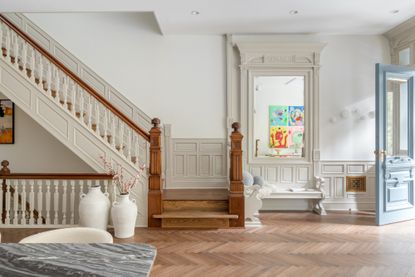This viral paint effect for creating realistic wood-grain is such an easy way to transform lackluster surfaces
Give your home a modern refresh with this DIY paint trick that creates a wood effect using just two products


Wooden accents make for a timeless interior design. Whether it's a shelf, tabletop, or staircase banister, a wooden surface never goes out of style. The problem is that installing hardwood - and even veneer - can be costly, but you can get the same wood grain effect on a budget thanks to the help of a little DIY.
It's all thanks to a clever paint trick that makes use of cream-colored paint and brown wax stain to replicate a wood grain effect, and it's taking the internet by storm. The paint idea is perfect for dated laminate surfaces or when sanding down painted wood is out of the question, and if you're looking to give your home a modern refresh on a budget, it's one of the best hacks we've seen. Here's how it works.
The perk of this paint technique is that it involves very few products. All you need is cream or beige paint, furniture wax, and a good-quality paintbrush. The viral trick has been doing the rounds over on TikTok, where users pair two Frenchic products, Crème De La Crème chalk paint and Browning Wax, applying one on top of the other. The result is an authentic-looking oak effect grain that instantly elevates your decor.
The hack has been used on everything from real timber beams to laminate countertops, where it results in the same surface texture and worn character of solid wood. All you need to do is apply a base coat of solid color, then add the browning wax with a stiff paintbrush for a grain effect finish.
'We called this the Frenchic beam hack as the technique has been widely used to update/revamp/renovate ceiling beams,' says Mandy Rippon, Product Manager at Frenchic. 'Where you have dark or black painted, oppressive looking wooden beams that are expensive and messy to strip back to lovely wood – you can just paint them with Crème de La Crème and then apply Browning Wax.'
How to create a faux wood paint effect
Maybe your wooden beams or banisters are looking dull and tired, or perhaps you want to change the look of your dated laminate shelving. Maybe you're just looking for a way to make your living room look more expensive with paint. Whatever the case, this trick is the easiest and cheapest way to give your surfaces a refresh.
First, it's a good idea to start by giving your surface a wipe with a damp cloth to remove any dust or dirt to help with the paint adhesion. Once dry, apply two coats of Frenchic's Crème De La Crème paint. The thick consistency of this chalk paint is self-priming, so there's no need to use a primer beforehand.
Apply the paint in the direction the woodgrain would run (usually lengthways) so that the brush strokes can contribute to the textured effect. The first coat should be touch dry within an hour and ready for a second coat within two.
'The best way to achieve an effective result is to try to create texture when applying the paint,' says Mandy. 'Over-work the paint a little to create brushstrokes. This allows the Browning Wax to define all the brush strokes and produces the wood-like effect.'
After the second coat has dried (it's best to wait a day for this) it's time to add the furniture wax. Using a stiff brush like Frenchic's Large Wax Brush, apply a liberal amount of the wax in short brush strokes. Don't strive for perfection - the more imperfect, the more genuine the grain effect will look. Be sure to feather out any marks between brush strokes by stippling your bristles so that the wax is blended together, too.
Once dry, you'll be left with a surface that looks so much like real oak, you'll have guests second-guessing!
@loushomelife ♬ original sound - Lou
What you'll need...

Price: $25.36
Color: Brown

Price: $16.29
Quantity: 4

Price: $24
Size: 25 fl oz
Be The First To Know
The Livingetc newsletter is your shortcut to the now and the next in home design. Subscribe today to receive a stunning free 200-page book of the best homes from around the world.

Lilith Hudson is the News Editor at Livingetc, and an expert at decoding trends and reporting on them as they happen. Writing news, features, and explainers for our digital platform, she's the go-to person for all the latest micro-trends, interior hacks, and color inspiration you need in your home. Lilith discovered a love for lifestyle journalism during her BA in English and Philosophy at the University of Nottingham where she spent more time writing for her student magazine than she did studying. After graduating, she decided to take things a step further and now holds an MA in Magazine Journalism from City, University of London, with previous experience at the Saturday Times Magazine, Evening Standard, DJ Mag, and The Simple Things Magazine. At weekends you'll find her renovating a tiny one-up, one-down annex next to her Dad's holiday cottage in the Derbyshire dales where she applies all the latest design ideas she's picked up through the week.
-
 The 12 Best Table Lamps for Reading —I'm a Certified Bookworm (and Shopping Expert)
The 12 Best Table Lamps for Reading —I'm a Certified Bookworm (and Shopping Expert)When it comes to table lamps for reading, I don't mess around. If you're the same, this edit is for YOU (and your books, or course — and good recommendations?)
By Brigid Kennedy Published
-
 "It's Scandi Meets Californian-Cool" — The New Anthro Collab With Katie Hodges Hits Just the Right Style Note
"It's Scandi Meets Californian-Cool" — The New Anthro Collab With Katie Hodges Hits Just the Right Style NoteThe LA-based interior designer merges coastal cool with Scandinavian simplicity for a delightfully lived-in collection of elevated home furnishings
By Julia Demer Published

